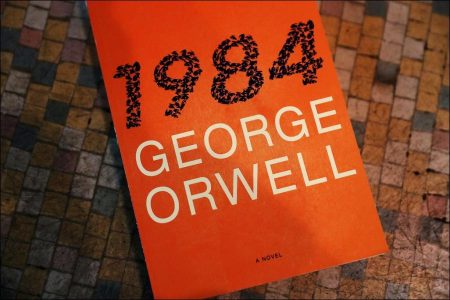Among the seminal texts of the 20th century, Nineteen Eighty-Four is a rare work that grows more haunting as its futuristic purgatory becomes more real. Published in 1949, the book offers political satirist George Orwell’s nightmarish vision of a totalitarian, bureaucratic world and one poor stiff’s attempt to find individuality.
The brilliance of the novel is Orwell’s prescience of modern life—the ubiquity of television, the distortion of the language—and his ability to construct such a thorough version of hell. Required reading for students since it was published, it ranks among the most terrifying novels ever written.
The dystopia described in George Orwell’s nearly 70-year-old novel “1984” suddenly feels all too familiar. A world in which Big Brother (or maybe the National Security Agency) is always listening in, and high-tech devices can eavesdrop in people’s homes. (Hey, Alexa, what’s up?) A world of endless war, where fear and hate are drummed up against foreigners, and movies show boatloads of refugees dying at sea. A world in which the government insists that reality is not “something objective, external, existing in its own right” — but rather, “whatever the Party holds to be truth is truth.”
“1984” shot to No. 1 on Amazon’s best-seller list this week, after Kellyanne Conway, an adviser to President Trump, described demonstrable falsehoods told by the White House press secretary Sean Spicer — regarding the size of inaugural crowds — as “alternative facts.” It was a phrase chillingly reminiscent, for many readers, of the Ministry of Truth’s efforts in “1984” at “reality control.” To Big Brother and the Party, Orwell wrote, “the very existence of external reality was tacitly denied by their philosophy. The heresy of heresies was common sense.” Regardless of the facts, “Big Brother is omnipotent” and “the Party is infallible.”
As the novel’s hero, Winston Smith, sees it, the Party “told you to reject the evidence of your eyes and ears,” and he vows, early in the book, to defend “the obvious” and “the true”: “The solid world exists, its laws do not change. Stones are hard, water is wet, objects unsupported fall toward the earth’s center.” Freedom, he reminds himself, “is the freedom to say that two plus two make four,” even though the Party will force him to agree that “TWO AND TWO MAKE FIVE” — not unlike the way Mr. Spicer tried to insist that Mr. Trump’s inauguration crowd was “the largest audience to ever witness an inauguration,” despite data and photographs to the contrary.
In “1984,” Orwell created a harrowing picture of a dystopia named Oceania, where the government insists on defining its own reality and where propaganda permeates the lives of people too distracted by rubbishy tabloids (“containing almost nothing except sport, crime and astrology”) and sex-filled movies to care much about politics or history. News articles and books are rewritten by the Ministry of Truth and facts and dates grow blurry — the past is described as a benighted time that has given way to the Party’s efforts to make Oceania great again (never mind the evidence to the contrary, like grim living conditions and shortages of decent food and clothing).
Not surprisingly, “1984” has found a nervous readership in today’s “post-truth” era. It’s an era in which misinformation and fake news have proliferated on the web; Russia is flooding the West with propaganda to affect elections and sow doubts about the democratic process; poisonous tensions among ethnic and religious groups are fanned by right-wing demagogues; and reporters scramble to sort out a cascade of lies and falsehoods told by President Trump and his aides — from false accusations that journalists had invented a rift between him and the intelligence community (when he had compared the intelligence agencies to Nazis) to debunked claims that millions of unauthorized immigrants robbed him of a popular-vote majority.
Orwell had been thinking about the novel that would become “1984” as early as 1944, when he wrote a letter about Stalin and Hitler, and “the horrors of emotional nationalism and a tendency to disbelieve in the existence of objective truth because all the facts have to fit in with the words and prophecies of some infallible führer.”
Decades later, in the 1970s, “1984” would frequently be cited as holding a mirror to the Nixon administration’s duplicitous handling of the war in Vietnam and its linguistic, “Newspeak”-like contortions over Watergate (like the press secretary Ron Ziegler’s description of his earlier statements as “inoperative”).
In his 1944 letter, Orwell presciently argued that “there is no such thing as a history of our own times which could be universally accepted, and the exact sciences are endangered as soon as military necessity ceases to keep people up to the mark.” And in “1984,” the word “science” does not even exist: “the empirical method of thought, on which all the scientific achievements of the past were founded, is opposed to the most fundamental principles” of the Party.
This sort of marginalization in “1984” speaks to some of the very fears scientists have expressed in response to reports that the Trump administration is scrutinizing studies and data published by researchers at the Environmental Protection Agency while placing new work on “temporary hold.” Similar concerns about an Orwellian consolidation and centralization of government media control have been expressed over administration efforts “to curb the flow of information from several government agencies involved in environmental issues,” and the possibility, as Politico reported, that the new White House might also try to put its stamp on the Voice of America, the broadcasting arm that “has long pushed democratic ideals across the world.”
Of course, all of these developments are being constantly updated, with regular flurries of news and denials and counterdenials — a confusing state of affairs that itself would not have surprised Orwell, since he knew the value of such confusion to those in power.
Another book, published two years after “1984,” also made Amazon’s list of top 100 best sellers this week: Hannah Arendt’s “The Origins of Totalitarianism” (1951). A kind of nonfiction bookend to “1984,” the hefty philosophical volume examines the factors that fueled the perfect storm of events leading to the rise of Hitler and Stalin and World War II — notably, the power that centralized storytelling can exert over anxious populations suffering from the dislocations of history, by offering scapegoats, easy fixes and simple cohesive narratives. If such narratives are riddled with lies, so much the better for those in power, who then succeed in redefining the daily reality inhabited by their subjects.
“Mass propaganda discovered that its audience was ready at all times to believe the worst,” Arendt wrote, “no matter how absurd, and did not particularly object to being deceived because it held every statement to be a lie anyhow.” This mixture of gullibility and cynicism, Arendt suggested, thrived in times rife with change and uncertainty, and was exploited by politicians intent on creating a fictional world in which “failures need not be recorded, admitted, and remembered.” In this world, 2 + 2 does = 5, as Orwell noted, and the acceptance of bad arithmetic simply becomes a testament to the power of rulers to define reality and the terms of debate.
A despairing vision to be sure, though Christopher Hitchens pointed out that Orwell’s own commitment in his life to continually seek “elusive but verifiable truth” was a testament to human tenacity and “that tiny, irreducible core of the human personality that somehow manages to put up a resistance to deceit and coercion.”
Views: 578



